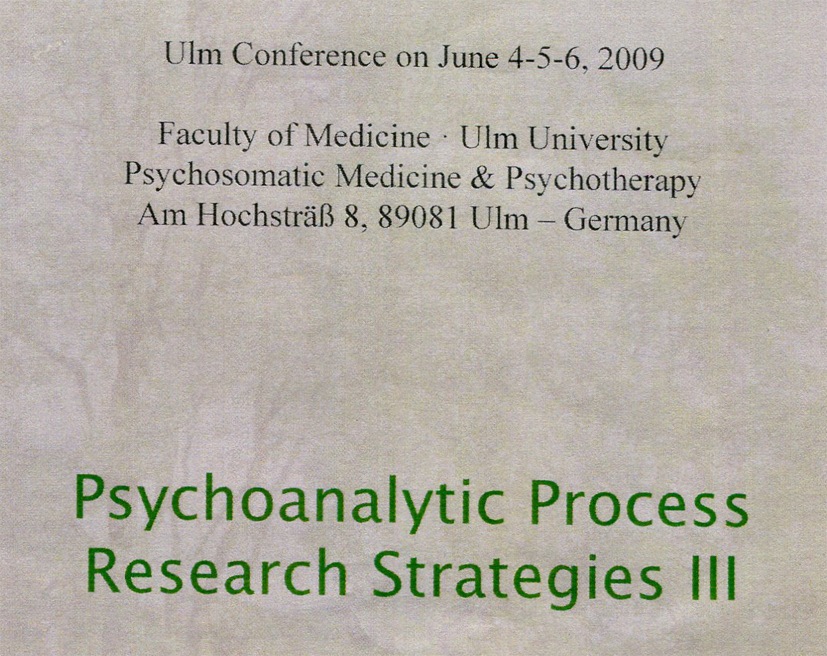Message + Media
2009 PPRS III
In 1985 as a pre-conference to the International Psychoanalytic Congress in Hamburg – the Department of Psychotherapy organized the first conference on Psychoanalytic Process Research strategies. This conference documented the creation of a field, as Hartvig Dahl put it. The proceedings were later published and the book is still available on my homepage (http://www.horstkaechele.de, in the English section):
H. Dahl, H. Kächele, H. Thomä (Eds.) (1988): Psychoanalytic Process Research Strategies. Springer Berlin Heidelberg New York
12 years later, in 1997, the second conference took place; the proceedings are also available on my homepage:
H. Kächele, E. Mergenthaler, R. Krause (Eds.) (1999): Psychoanalytic Process Research Strategies II. Ulm, Ulm Textbank
Now the third conference in June 2009 was devoted to the evaluation of long term psychoanalytic-psychodynamic therapies in the times of evidence based medicine.
Long term treatments are hard to study in the frame of RCTs; patients and therapists too often are not motivated to accept the tight frames of such studies. So how to generate evidence of „what works for whom“ has been a crucial matter in many countries. Does it make sense to maintain the distinction of efficacy and effectiveness for long-term treatments as well?
Is it possible to perform a randomezed-controlled trial comparing high and low frequency psychoanalytic treatment . Such questions formed the core of the conference and the experiences of European researcher have provided the state of the art on these issues.
Horst Kächele
The following is a list of the contents of the seven DVDs.
DVD 1: Welcome addess from the host Prof. H. Kaechele also reading the welcome address from the German Medical Association; from the president of German Society for Psychotherapy, Psychoanalysis, Psychosomatics and Depth-Psychology Dr. K. Muench. G. Roth (Bremen): Do we need biological measures for evaluating long-term treatments. A. Buchheim (Innsbruck), S. Taubner (Kassel), D. Wiswede (Ulm) & H. Kaechele (Ulm): Neural correlates of attachment patterns in depressed patients: First findings of the HANSE-Neuro-Psychoanalysis Study. J. Lehtonen (Helsinki): Molecular findings on serotonin transporter levels in relation to one-year psychodynamic psychotherapy of drug-naive patients with depression using the SPET brain imaging method.
DVD 2: Welcome address from Prof. R. Richter (president of the German Chamber for Psychological Psychotherapists) and from G. Schlessinger-Kipp (vice-president of the German Psychoanalytic Association). P. Fonagy (London): Mentalisation as common factor in the pschotherapeutic process. F. Leichsenring (Giessen) &
S. Rabung (Hamburg): The effectiveness of long-term psychodynamic psychotherapy.
DVD 3: T. Grande, W. Keller, Th. Jakobsen & G. Rudolf (Heidelberg-Berlin): Precnditions and effects of structural change in the Heidelberg-Berlin study of psychoanalytic long-term psychotherapy. R. Sandell (Stockholm): An individual difference perspective on treatment outcome.
DVD 4: P. Luyten (Louvain): Different folks need different strokes: An interpersonal-psychodynamic approach to the treatment of patients with personality disorders.
B. Strauss (Jena):Do interpersonal and attachment characteristics tell us something about desirable treatment length?
DVD 5: Th. Jakobsen (Basel): What happens when the symptoms don’t change?
C. Berghout (Amsterdam): A study of the effects of long-term psychoanalytic
psychotherapy/psychoanalysis.
DVD 6: M. Leuzinger-Bohleber and colleagues (Frankfurt): Psychoanalytic and cognitive-behavioral treatments: First data on the LARC depression study. I. Harpaz-Rotem (New Haven): Pathway to therapeutc change: change in self-representation in long-term pschodynamic treatment of adolescents and young adults.
DVD 7: R. Krause (Saarbruecken): The German system for the evaluation of public payment of psychotherapeutic treatments. R. Richter (Berlin): Psycho-politics- comments from the president of the German Chamber of Psychological Psychotherapists H. Kaechele (Ulm): Recommendations for future psychoanalytic treatment research.

- Namen:
- PPRS III